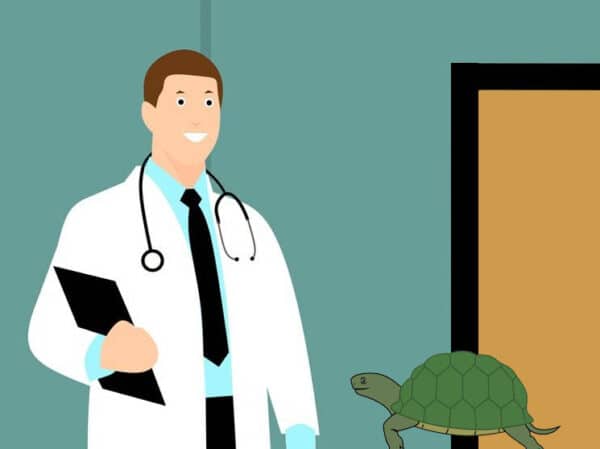
Tortoises need to be taken to the vet, but not as often or for the same reasons as dogs or cats that require jabs once in a while. Although it’s not absolutely necessary, it’s still a good idea to take a tortoise for a vet checkup before hibernation.
Having a pet is a joyous pursuit, particularly if you have a soft spot for animals in general. They enrich your life and keep you company, but this goes hand in hand with responsibility. Pets are totally dependent on you, so you need to be able to take great care of them.
Apart from feeding and cleaning them, caring for pets also includes taking them to the vet. Vet checkups are necessary now and then for all animals, sometimes as a matter of course.
A tortoise is clearly very different from the mammals most people keep as pets, and their needs are also very different. Should you take your tortoise to the vet regularly? If you want to take care of your tortoise the right way, read on to find out more.
Taking Your Tortoise for Vet Checkups
I think it’s fair to say tortoises are not the most common pets. Usually, people keep dogs, cats, parrots, or hamsters as pets. Tortoises are not as common, and that’s largely because they require a greater commitment given that they live far longer than other pets.
But it’s exactly because tortoises are not common animals that they are not often taken to the vet, or at least not taken when they should be. Few people are aware of a tortoise’s needs, or how to spot health issues that may require urgent attention from a veterinarian.
Sadly, this could lead to a worsening conditions for sick tortoises and, in the worst-case scenario, even death.
While you don’t have to take your tortoise to the vet as often as you take a dog, for instance, it is best practice to book a vet checkup at least once a year. This will only need to be a simple checkup, and doesn’t need to be carried out by a specialist. It shouldn’t be that difficult to find some time to do this once every 12 months.
If your tortoise lives outdoors, or spends time outdoors, then you have even greater reason to ensure vet checkups. Although life outdoors is generally better for tortoises, thanks to it being closer to their natural habitat, it also means they may be exposed to drastic changes in weather, excessive humidity, bacteria, and so on, all of which present some risk of illness or infection.
When Should You Bring Your Tortoise to the Vet?
Apart from the annual checkup, there are some situations that require urgent vet attention. If you’re sick, you go to the doctor, and the same should apply to your pet tortoise.
A veterinarian will be able to diagnose the problem, and then provide the best treatment so your pet can go back to being healthy and happy. You might also receive some advice on how to keep your tortoise healthy in the future.
Besides explicit signs of infection or injury, such as a dog bite, or a cracked shell, here are some more subtle signs that tell you a visit to the vet is the best thing to do:
- Nasal Discharge
Tortoises can get runny noses too, although the causes for this issue are different than they are for humans, and are often more serious than the common cold you would most associate with a runny nose.
If there is any clear or cloudy discharge coming out of the tortoise’s nose, then there might be an upper respiratory disease manifesting. Sometimes nasal discharge can even be an indicator of impending pneumonia.
Of course, the discharge itself is not a sign of pneumonia, but it is a reflection of disease in the oral cavity or upper airway, that may be spreading to the lower respiratory tract.
An upper respiratory infection may occur as a result of vitamin A deficiency, although other nutritional imbalances might cause it too. This of course highlights the importance of proper nutrition and its role in preventing infection.
Respiratory infections in tortoises sometimes also start from the Mycoplasma organism, which your vet may suspect if the tortoise’s diet is generally okay. This can be detected with a simple DNA PCR test.
If you notice that your tortoise has a runny nose, take it to the vet to properly diagnose the problem and find an appropriate treatment. Not taking action might make the problem worse.
- Your Tortoise Is Not Eating
Sometimes, the fact that a tortoise is not eating is a sign of the inaction or incorrect actions of the owner. You might for example have incorrect lighting or improper temperature control in your enclosure.
At other times preparing for hibernation is the most likely reason why a tortoise has suddenly stopped eating.
In the worst case scenario, it might simply be that the tortoise is showing signs of an underlying health issue, so if you suspect this is the case you should take immediate action.
If you think your tortoise is not about to hibernate and the temperature, lighting, and everything else in the enclosure is right, make sure to take it to the vet. They will be best placed to tell if there’s a much deeper issue that must be treated.
Even if you are being over cautious it is better to be safe than sorry.
- Eyes Not Opening
It may be strange to imagine a tortoise being unable to open its eyes, but this can happen. The most common causes are post-hibernation anorexia, vitamin A deficiency, trapped plant matter, third eyelid problems, abscesses, or infection of the eyelids.
Once again you should take the tortoise to the vet to find out the root cause of the problem. Even if you don’t think it’s anything serious, it’s best to do it just to be sure.
It is true that some tortoises just like keeping their eyes closed longer than normal, so you might find your vet says there is nothing wrong with the tortoise, in which case you shouldn’t worry.
- Stomatitis
Stomatitis is known as mouth rot, and it’s a common health issue in tortoises. It occurs when there is an open wound in the tortoise’s mouth, and bacteria proceed to infect the site of the wound.
This causes an infection in the lining of the mouth and gums. Some symptoms include swelling in the mouth or a change of color in the tortoise’s mouth. Loss of appetite might also occur. If there is a white discharge around the mouth, this may also be a sign of mouth rot.
Clearly the potential for this infection to spread and take a very serious turn means you take the tortoise to the vet as soon as possible.
Shell rot is also a common issue. If the shell and skin are affected, abscesses might occur.
Injuries and ticks are the most common reasons why shell rot occurs, and the issue can be both fungal or bacterial. A vet can help treat the problem and remove and sedate the affected tissue. Afterward, the shell will be cleaned, and antibiotic injections will be administered.
Final Thoughts
Whereas tortoises don’t require to be taken to the vet that frequently, they still need vet attention sometimes. Take them for a checkup at least once every year, and always get veterinary help if you notice any other health issue.


